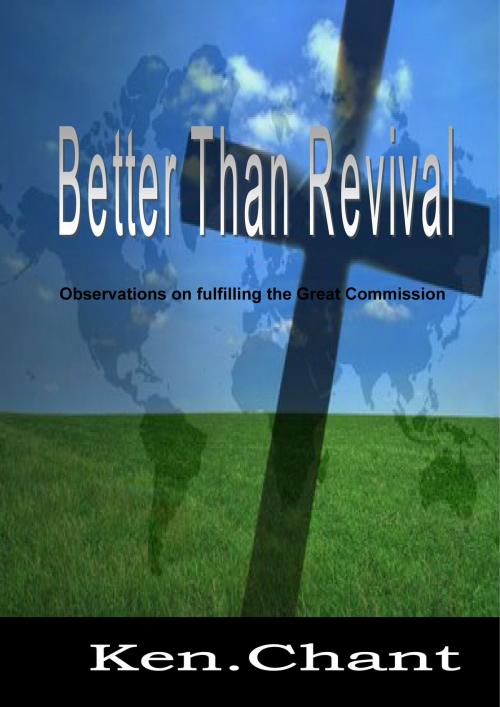| Author: | Ken Chant | ISBN: | 9781310873980 |
| Publisher: | Vision Colleges | Publication: | August 18, 2015 |
| Imprint: | Smashwords Edition | Language: | English |
| Author: | Ken Chant |
| ISBN: | 9781310873980 |
| Publisher: | Vision Colleges |
| Publication: | August 18, 2015 |
| Imprint: | Smashwords Edition |
| Language: | English |
There are two common approaches to the theme of "revival" among evangelical Christians, and also, unfortunately, among many charismatics. I say "unfortunately" because neither of these approaches reflects the New Testament model. This study will argue for a third approach (see Chapter Three below), which, it will be claimed, does conform to the New Testament pattern.
The subject is an important one, because one's assumptions concerning "revival" have a determinative effect upon many other areas of personal and corporate life in the local church. Your views on revival will shape your -
approach to prayer
•where revival is defined as an unpredictable divine visitation then prayer will be focussed on fervent pleading for God to act; but where revival is seen as a product of fulfilling the Great Commission then prayer will be focussed on the Lord prospering the evangel.
expectations from God
•one view leads to a fatalistic crying out to the Lord for showers of mercy; the other leads to a bold seizure of all the resources that are available in Christ, thus ensuring that his missionary mandate is fulfilled (Mt 28:19-20; Mk 16:15-20).
ministry goals
•where revival is seen as a more or less arbitrary act by God, ministry tends to be focussed on patiently keeping the church together until God chooses to send a "revival"; but where revival is measured by successful evangelism and church planting, then ministry tends to be focussed upon confident outreach, with an expectation of continuous life and blessing.
attitudes towards yourself
•the first view tends to create constant introspection, based upon a belief that "revival" cannot happen until the church becomes "holy"; the other leads to an acceptance of righteousness in Christ, and to confidence that God will use the church as it is.
concepts of the church
•the first view is prone to see the church as weak, helpless, and unable to fulfil the demands of the evangel unless a "revival" first happens; the other sees the church, with all its faults, as fully competent to rise up in Jesus' name and reap the waiting harvest.
concepts of the world
•the first view tends toward a ghetto complex, where the church is huddled together against the world, which it sees only in terms of enmity and corruption; the other looks upon the world more positively, with strong confidence that brave preaching of the gospel will attract a fruitful response.
ideas on church polity
•the principles upon which the local church is based, its organisational dynamics, its style and emphases, its expectations and attitudes, will all be deeply influenced (whether consciously or unconsciously) by its philosophy of revival.
There is, then, hardly any area of personal or congregational life that remains unaffected by the concept of revival held by the local church. Which view should we adopt? I make no claim to infallibility, nor to final authority; but you will at least find here some ideas that deserve to be carefully considered .
Let me begin with the first of the two common models of revival, one that is widely held among evangelical, charismatic, and Pentecostal Christians. We could call it
There are two common approaches to the theme of "revival" among evangelical Christians, and also, unfortunately, among many charismatics. I say "unfortunately" because neither of these approaches reflects the New Testament model. This study will argue for a third approach (see Chapter Three below), which, it will be claimed, does conform to the New Testament pattern.
The subject is an important one, because one's assumptions concerning "revival" have a determinative effect upon many other areas of personal and corporate life in the local church. Your views on revival will shape your -
approach to prayer
•where revival is defined as an unpredictable divine visitation then prayer will be focussed on fervent pleading for God to act; but where revival is seen as a product of fulfilling the Great Commission then prayer will be focussed on the Lord prospering the evangel.
expectations from God
•one view leads to a fatalistic crying out to the Lord for showers of mercy; the other leads to a bold seizure of all the resources that are available in Christ, thus ensuring that his missionary mandate is fulfilled (Mt 28:19-20; Mk 16:15-20).
ministry goals
•where revival is seen as a more or less arbitrary act by God, ministry tends to be focussed on patiently keeping the church together until God chooses to send a "revival"; but where revival is measured by successful evangelism and church planting, then ministry tends to be focussed upon confident outreach, with an expectation of continuous life and blessing.
attitudes towards yourself
•the first view tends to create constant introspection, based upon a belief that "revival" cannot happen until the church becomes "holy"; the other leads to an acceptance of righteousness in Christ, and to confidence that God will use the church as it is.
concepts of the church
•the first view is prone to see the church as weak, helpless, and unable to fulfil the demands of the evangel unless a "revival" first happens; the other sees the church, with all its faults, as fully competent to rise up in Jesus' name and reap the waiting harvest.
concepts of the world
•the first view tends toward a ghetto complex, where the church is huddled together against the world, which it sees only in terms of enmity and corruption; the other looks upon the world more positively, with strong confidence that brave preaching of the gospel will attract a fruitful response.
ideas on church polity
•the principles upon which the local church is based, its organisational dynamics, its style and emphases, its expectations and attitudes, will all be deeply influenced (whether consciously or unconsciously) by its philosophy of revival.
There is, then, hardly any area of personal or congregational life that remains unaffected by the concept of revival held by the local church. Which view should we adopt? I make no claim to infallibility, nor to final authority; but you will at least find here some ideas that deserve to be carefully considered .
Let me begin with the first of the two common models of revival, one that is widely held among evangelical, charismatic, and Pentecostal Christians. We could call it















